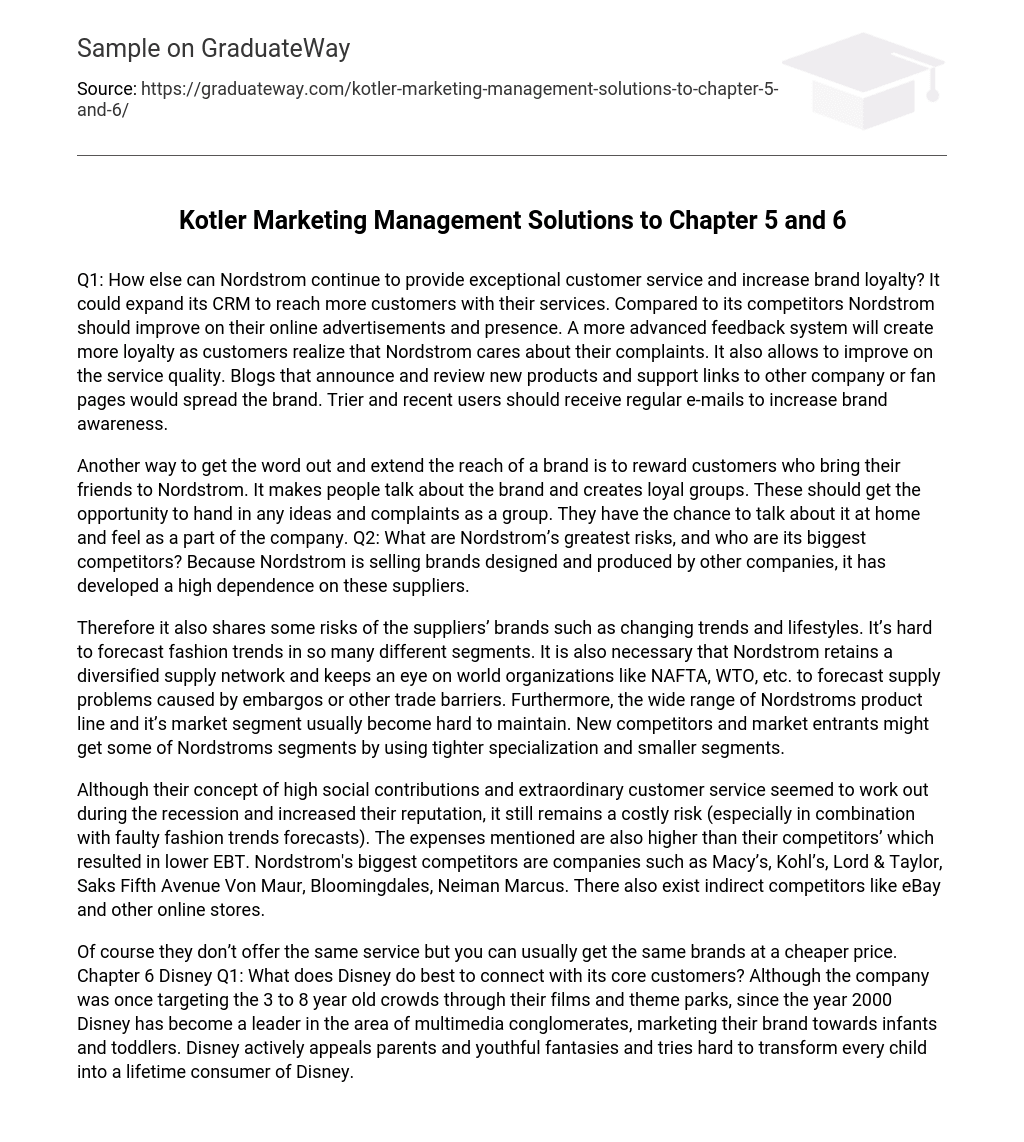Q1: How else can Nordstrom continue to provide exceptional customer service and increase brand loyalty? It could expand its CRM to reach more customers with their services. Compared to its competitors Nordstrom should improve on their online advertisements and presence. A more advanced feedback system will create more loyalty as customers realize that Nordstrom cares about their complaints. It also allows to improve on the service quality. Blogs that announce and review new products and support links to other company or fan pages would spread the brand. Trier and recent users should receive regular e-mails to increase brand awareness.
Another way to get the word out and extend the reach of a brand is to reward customers who bring their friends to Nordstrom. It makes people talk about the brand and creates loyal groups. These should get the opportunity to hand in any ideas and complaints as a group. They have the chance to talk about it at home and feel as a part of the company. Q2: What are Nordstrom’s greatest risks, and who are its biggest competitors? Because Nordstrom is selling brands designed and produced by other companies, it has developed a high dependence on these suppliers.
Therefore it also shares some risks of the suppliers’ brands such as changing trends and lifestyles. It’s hard to forecast fashion trends in so many different segments. It is also necessary that Nordstrom retains a diversified supply network and keeps an eye on world organizations like NAFTA, WTO, etc. to forecast supply problems caused by embargos or other trade barriers. Furthermore, the wide range of Nordstroms product line and it’s market segment usually become hard to maintain. New competitors and market entrants might get some of Nordstroms segments by using tighter specialization and smaller segments.
Although their concept of high social contributions and extraordinary customer service seemed to work out during the recession and increased their reputation, it still remains a costly risk (especially in combination with faulty fashion trends forecasts). The expenses mentioned are also higher than their competitors’ which resulted in lower EBT. Nordstrom’s biggest competitors are companies such as Macy’s, Kohl’s, Lord & Taylor, Saks Fifth Avenue Von Maur, Bloomingdales, Neiman Marcus. There also exist indirect competitors like eBay and other online stores.
Of course they don’t offer the same service but you can usually get the same brands at a cheaper price. Chapter 6 Disney Q1: What does Disney do best to connect with its core customers? Although the company was once targeting the 3 to 8 year old crowds through their films and theme parks, since the year 2000 Disney has become a leader in the area of multimedia conglomerates, marketing their brand towards infants and toddlers. Disney actively appeals parents and youthful fantasies and tries hard to transform every child into a lifetime consumer of Disney.
The newer marketing campaigns target newborns. Disney attempts to partner with hospitals to market the latest line, Disney Baby. Such a partnership allows Disney to increase its customer base and build brand loyalty from the earliest opportunity. The brand continued to expand over several decades. It covers Movies, Books, DVD’s, Toys, recording labels, theatrical perfomances, theme parks and Media networks (e. g. ESPN, ABC and the Disney Channel). With every Disney “brand” present on Facebook the company is able to interact and connect with a vast audience of fans – from young to old.
Q2: What are the risks and benefits of expanding the Disney brand in new ways? Because Disney is active in so many market segments it has also got a lot of strong and specialized competitors such as ABS, CBN and any form of entertainment. Walt Disney World for example, includes several different theme parks within its resort. Additionally, they have opened up some water parks (e. g. Typhoon Lagoon and Blizzard Beach). They have also expanded beyond their traditional brands (mentioned in answer to Q1) with the ESPN Wide World of Sports attraction.
On top of all of this, Walt Disney World operates several different hotels and a campground. This diverse product portfolio may represent a weakness because managing such different products can reduce efficiency and lead to a lack of strategic focus. The brand has to compete with different outdoor activities, other theme parks, online retailers such as Amazon (vs. Disney’s online store). In addition to that, it’s also very costly and challenging to keep everything under control. Another problem is handling the balance between the respect for heritage (of the Disney brand) and innovation.
It’s easy to get lost in other business activities that don’t match the core brand values. Therefore Disney’s great legacy is also it’s risk. Although the brand is well known it is still subject to market forces. The companies stronghold are its characters which it can license to other companies or forms of distribution. Walt Disney is one of the most famous names in the entertainment business associated with numerous animated films, theme parks and resorts. Disney has bought the Mirimax film studio and the Pixar animation company, allowing it to access an even more brands and characters.





